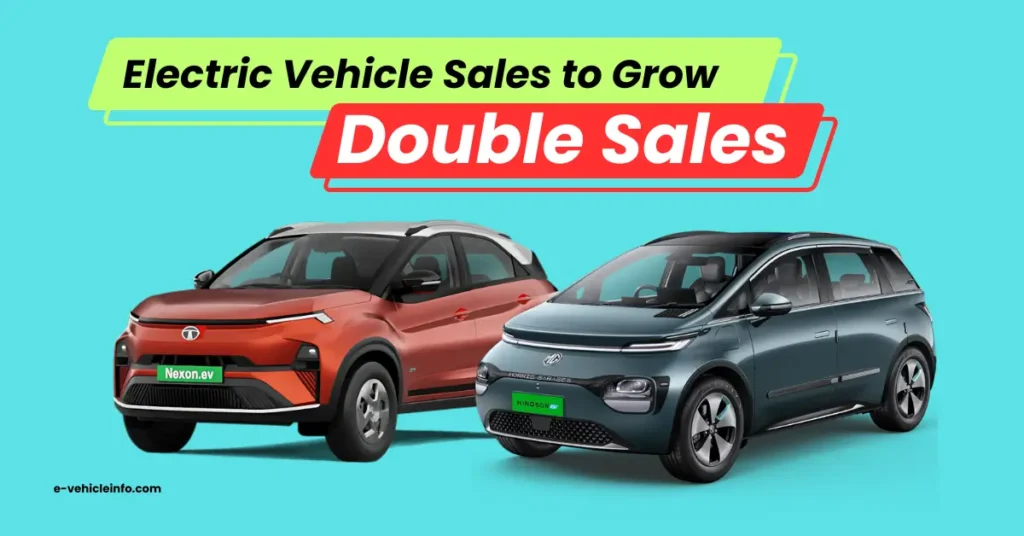

 Electric vehicle sales will double this year, market penetration will reach 4% in 2025, know what are the possible reasons for EV sales growing at a very fast pace.
Electric vehicle sales will double this year, market penetration will reach 4% in 2025, know what are the possible reasons for EV sales growing at a very fast pace.
The race for dominance in the electric vehicle (EV) market is intensifying, especially in the passenger car segment.
Major automakers, including Mahindra & Mahindra, Maruti Suzuki, Hyundai, Tata Motors, MG Motors, and JSW, are all gearing up to launch new electric models, making 2025 a pivotal year for EV adoption in India.
New Launches and Competitive Pricing
As the competition picks up, Mahindra & Mahindra is leading the charge with the announcement of their new electric vehicles, the BE6 and XEV9e.

 This model, The Mahindra BE 6 is currently priced from Rs 18.9 to Rs 26.9 lakh (ex-showroom). and the Mahindra XEV 9e’s prices range from Rs 21.9 lakh to Rs 30.5 lakh (ex-showroom. both of these EV models are packed with high-end features typically seen in luxury cars.
This model, The Mahindra BE 6 is currently priced from Rs 18.9 to Rs 26.9 lakh (ex-showroom). and the Mahindra XEV 9e’s prices range from Rs 21.9 lakh to Rs 30.5 lakh (ex-showroom. both of these EV models are packed with high-end features typically seen in luxury cars.
From ADAS (Level 2+) technology to a 16-speaker Harman Kardon sound system and augmented reality heads-up displays, Mahindra is positioning these EVs to compete directly with premium options like the Mercedes EQA and Audi Q8 e-tron.
The company has also introduced top variants with prices ranging from ₹26.9 lakh to ₹30.5 lakh.
This competitive pricing strategy ensures that electric vehicles are now positioned closer to traditional internal combustion engine (ICE) SUVs in the market, making EVs more accessible to a wider audience.
For instance, Mahindra’s XUV700, a popular ICE SUV, is priced between ₹14 lakh and ₹26 lakh, while the Hyundai Creta starts at ₹11 lakh and goes up to ₹20.2 lakh for the top variants.
Stronger Offerings from Top OEMs
Other players like Hyundai and Maruti are not far behind. Hyundai is set to launch the electric version of its popular Creta at the Bharat Mobililtuy Global Expo 2025, with pricing expected between ₹20 lakh and ₹30 lakh. Find the list of 22 New Electric Cars to be Launched and Showcased at Bharat Mobility Expo 2025
.
The electric Creta will offer a driving range of over 450 km on a single charge, catering to the growing demand for long-range EVs.
Maruti Suzuki, after years of anticipation, is finally unveiling its electric vehicle, the EV Vitara, which is expected to offer a range of over 500 km per charge and will be priced competitively between ₹20 lakh and ₹30 lakh.
MG Motors, which already has a strong foothold in the EV market with models like the ZS EV, is also planning to introduce new electric SUVs, including the Sierra and Harrier EV, both expected to deliver over 500 km of range.
These new launches, with aggressive pricing and extended ranges, are set to disrupt the market further.
A Turning Point for EV Adoption
The competition is already having an impact. In 2024, the EV market share stood at just 2%, but with so many new models hitting the market in 2025, experts predict the penetration will nearly double to 4%.
This surge in competition and the influx of new models with appealing price points, longer ranges, and advanced features are likely to drive sales significantly.
Mahindra, in particular, is expected to sell around 5,000–6,000 units per month of their B6 and XUV9e, with an eventual capacity of 10,000 units per month by 2027.
Tata Motors, which has led the EV market in recent years, may face some pressure as competitors increase their presence, especially with new entries from Mahindra, Maruti, and Hyundai.
Tata’s share of the EV market has already dipped from 73% in 2023 to 62% in 2024. Find here India’s top electric car companies and their markers share as of 2025.
However, the company will still play a crucial role with its new models like the Harrier EV and Sierra, which are expected to enter the market in 2025.
Final Thoughts
As 2025 unfolds, the EV market in India is poised for significant growth.
The race among automakers to offer competitive prices, innovative features, and long driving ranges is expected to elevate EV penetration to 4%, almost doubling sales compared to previous years.
With Mahindra, Maruti, Hyundai, and other major players launching aggressive offerings, the stage is set for a fierce battle in the electric passenger car segment, ultimately driving the shift towards sustainable mobility.